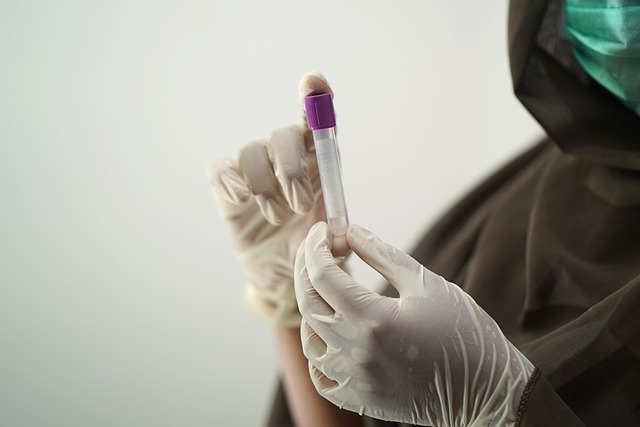The UK Standard Liver Blood Test (SLBT), which includes GGT as a key component, is not merely a marker of liver health but also an indirect indicator of testosterone levels in men. This test plays a significant role in assessing male hormonal status by providing insights into the balance of this critical hormone that affects reproductive development, sexual function, muscle mass, bone density, and red blood cell production as well as mental and cognitive health. Maintaining adequate testosterone levels is crucial for overall male vitality and well-being. The SLBT, analyzed using advanced techniques like LC-MS to differentiate between total and bioavailable testosterone, offers a non-invasive way to monitor hormonal status, with normal ranges defined for the UK population. If results indicate suboptimal levels, further evaluations and tailored treatments can be initiated. Regular SLBT monitoring is recommended as part of a comprehensive health strategy for men, especially as they age, to help prevent and manage conditions linked to testosterone imbalances, thereby improving their quality of life. This approach ensures a thorough evaluation of male endocrine health within the UK healthcare system.
Investigating the intricacies of male health often leads to the pivotal role of testosterone, a hormone central to numerous physiological processes. This article demystifies the importance of testosterone and its impact on well-being, guiding UK residents through the straightforward process of testing levels via the UK Standard Liver Blood Test. By understanding how this simple test can reveal insights into overall health, men can take informed steps towards maintaining optimal hormonal balance
- Understanding Testosterone and Its Role in Male Health
- The Process of Testosterone Level Testing in the UK: A Step-by-Step Guide
- Interpreting Results: What Your UK Standard Liver Blood Test Says About Your Testosterone Levels and Male Health
Understanding Testosterone and Its Role in Male Health

Testosterone is a pivotal hormone in male physiology, influencing a myriad of bodily functions and systems. It plays a key role in the development of male reproductive tissues, the maintenance of sexual function, muscle mass, bone density, and red blood cell production. Beyond its impact on physical attributes, testosterone also affects mental well-being and cognitive function. Adequate levels of this hormone are crucial for maintaining overall health and vitality in men.
Understanding the intricacies of testosterone is essential for early detection and management of male health issues. The UK Standard Liver Blood Test, often abbreviated as SLBT, is a critical tool in assessing liver health but also provides insights into an individual’s testosterone levels. Since the liver is responsible for producing proteins necessary for hormone transport in the body, its function can indirectly impact hormonal balance. Thus, monitoring testosterone through this standardized blood test can offer valuable information about a man’s endocrine health and serve as an indicator of his general well-being. Regular testing, alongside a comprehensive male health assessment, allows for timely interventions should levels fall outside the normal range. This proactive approach to health maintenance can significantly enhance the quality of life for men by addressing issues related to hormonal imbalances before they escalate into more serious conditions.
The Process of Testosterone Level Testing in the UK: A Step-by-Step Guide

In the UK, monitoring testosterone levels is a critical component of male health assessments, often conducted to diagnose or manage conditions such as hypogonadism and other hormonal imbalances. The process begins with an initial consultation with a healthcare provider, who will evaluate symptoms and medical history that may indicate a hormonal issue. Following this assessment, the UK Standard Liver Blood Test is ordered; this test indirectly measures testosterone levels by assessing liver function, as testosterone is primarily produced in the testes but with partial synthesis in the liver. The blood sample required for this test is typically drawn from a vein in the arm, usually in a GP’s office or a hospital phlebotomy suite.
Once the blood sample is collected, it is sent to an accredited laboratory for analysis. The laboratory employs techniques such as liquid chromatography-mass spectrometry (LC-MS) to accurately measure testosterone levels. This method differentiates total testosterone from free or bioavailable testosterone, providing a more comprehensive picture of hormonal health. Results are then interpreted by the healthcare provider, who will consider the normal range—typically 12 to 35 nmol/L in the UK—to determine if a man’s levels fall within the expected range for his age and overall health. If testosterone levels are found to be low or imbalanced, additional tests may be conducted to explore the underlying cause, followed by appropriate treatment options tailored to the individual’s specific needs.
Interpreting Results: What Your UK Standard Liver Blood Test Says About Your Testosterone Levels and Male Health

The UK Standard Liver Blood Test, commonly known as the GGT (gamma-glutamyl transferase) test, is often used as an initial indicator of liver health but can also provide insights into a man’s overall hormonal status, including testosterone levels. Elevated GGT levels may suggest liver issues, but they can also be indicative of other factors such as high testosterone. It’s important for healthcare providers to consider the context of other clinical findings when interpreting these results. For instance, if a man presents with elevated GGT levels alongside symptoms like fatigue or reduced libido, it may prompt further investigation into his hormonal profile, including testosterone testing. Testosterone plays a pivotal role in male health, influencing not only sexual function but also muscle mass, bone density, and overall energy levels. Therefore, if the GGT test indicates high levels of this enzyme, it’s advisable for men to consult their healthcare provider for a comprehensive evaluation of testosterone and other relevant hormones. This can lead to tailored interventions that address any imbalances or deficiencies, thereby supporting male health and well-being. Additionally, regular monitoring of both GGT and testosterone levels can be an integral part of preventative healthcare strategies for men, especially as they age and the body’s hormonal balance can shift.
Men’s health is a multifaceted topic, with testosterone playing a pivotal role in various physiological functions. Understanding the significance of maintaining optimal testosterone levels is crucial for overall male well-being. The UK Standard Liver Blood Test emerges as a vital tool in this context, offering insight into one’s hormonal health through a simple, accessible procedure. This article has demystified the process and interpretation of such tests, empowering men to proactively manage their health. It is evident that regular monitoring can lead to early detection and management of issues related to testosterone deficiency, thereby enhancing the quality of life for many individuals. By prioritising this aspect of healthcare, men across the UK can take informed steps towards maintaining their vitality and addressing potential health concerns with confidence.
